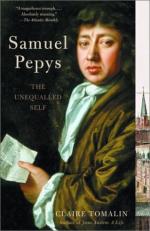24th. Up, and with [Sir] W. Pen to St. James’s, and there the Duke of York was preparing to go to some further ceremonies about the Garter, that he could give us no audience. Thence to Westminster Hall, the first day of the Term, and there joyed Mrs. Michell, who is mightily pleased with my wife’s work yesterday, and so away to my barber’s about my periwigg, and then to the Exchange, there to meet Fenn about some money to be borrowed of the office of the Ordnance to answer a great pinch. So home to dinner, and in the afternoon met by agreement (being put on it by Harry Bruncker’s frighting us into a despatch of Carcasse’s business) [Lord] Bruncker, T. Harvey, [Sir] J. Minnes, [Sir] W. Batten, and I (Sir W. Pen keeping out of the way still), where a great many high words from Bruncker, and as many from me and others to him, and to better purpose, for I think we have fortified ourselves to overthrow his man Carcasse, and to do no honour to him. We rose with little done but great heat, not to be reconciled I doubt, and I care not, for I will be on the right side, and that shall keep me: Thence by coach to Sir John Duncomb’s’ lodging in the Pell Mell,—[See November 8th, 1664]—in order to the money spoken of in the morning; and there awhile sat and discoursed.: and I find him that he is a very proper man for business, being very resolute and proud, and industrious. He told me what reformation they had made in the office of the Ordnance, taking away Legg’s fees:
[William Legge, eldest son of Edward Legge, sometime Vice-President of Munster, born 1609(?). He served under Maurice of Nassau and Gustavus Adolphus, and held the rank of colonel in the Royalist army. He closely attached himself to Prince Rupert, and was an active agent in affecting the reconciliation between that prince and his uncle Charles I. Colonel Legge distinguished himself in several actions, and was wounded and taken prisoner at the battle of Worcester; it was said that he would have “been executed if his wife had not contrived his escape from Coventry gaol in her own clothes.” He was Groom of the Bedchamber to Charles I., and also to Charles




